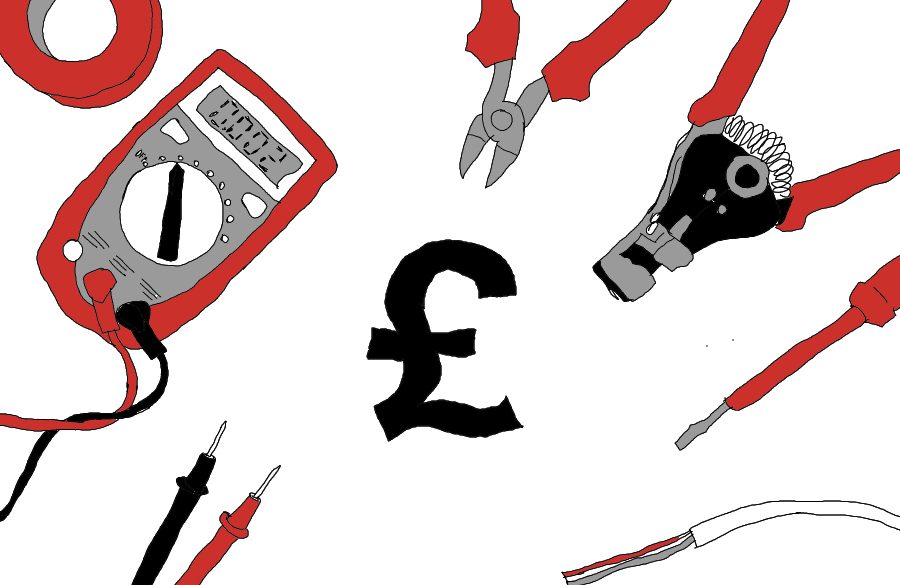The Highest Paid Trade in the UK

In the world of skilled trades, the role of an electrician has emerged as one of the most highly sought-after and well-compensated professions. With the UK experiencing a growing demand for renewable energy, smart home installations, and electric vehicle infrastructure, electricians have become essential to the country’s economic and technological development. Why electricians have risen to the top of the earnings ladder, what the job entails, and how you can become part of this lucrative industry?
How Much Do Electricians Earn?
On average, electricians in the UK earn around £34,000 per year, with experienced professionals earning significantly more. Those working on high-end commercial projects or in specialized fields such as electrical engineering or renewable energy can see their earnings exceed £50,000 annually. Self-employed electricians who run their own businesses or contract work can potentially earn six-figure incomes, depending on their clientele and the complexity of their projects.
In comparison to other trades, electricians consistently top the list of the highest-paid skilled workers in the UK. According to reports, the earnings potential for an electrician exceeds that of plumbers, carpenters, and bricklayers. As the demand for electrical expertise continues to grow, wages are likely to increase even further.
Why Are Electricians the Highest Paid?
Increasing Demand
The UK is undergoing a significant transformation, particularly in its energy infrastructure. The push toward renewable energy sources such as solar power and wind farms has opened new avenues for electricians to work on complex installations. As the country moves to electrify transport through electric vehicle (EV) charging points, homes and businesses are also demanding smart technology and energy-efficient systems. This growing need for specialist knowledge in modern electrical systems has driven up the demand for skilled electricians, pushing wages higher.
Complex Skill Set
Unlike some other trades, electricians must possess a deep understanding of electrical theory, safety protocols, and the latest technologies. The work involves everything from wiring buildings to installing and maintaining sophisticated electronic systems. Electricians must stay up-to-date with new standards, tools, and techniques, making the profession one that requires continuous learning and advanced skills.
Licensing and Certification
The rigorous qualification process contributes to higher pay. In the UK, electricians need to go through years of training and apprenticeships before becoming fully licensed. Achieving qualifications such as City & Guilds 2365 or 2391 (Inspection and Testing) proves an electrician’s competency and dedication to safety and quality. With these certifications, electricians can command higher rates and access more prestigious projects.
Safety Responsibilities
Electricians handle high-stakes work where safety is paramount. A single mistake could have serious consequences, from electrical fires to life-threatening shocks. The responsibility of ensuring safety and compliance with UK electrical standards, such as those set out by the National Inspection Council for Electrical Installation Contracting (NICEIC), justifies the high salaries these professionals earn.
Varied Work Opportunities
Electricians can work across various sectors, from residential and commercial projects to large industrial complexes and government contracts. As energy systems become more complex and environmentally friendly, electricians’ scope of work widens, offering them the opportunity to take on niche, high-paying projects like renewable energy installations or smart home systems.
Becoming an Electrician: How to Get Started
If you’re considering a career as an electrician, you’re entering a trade that offers job security, excellent pay, and continuous opportunities for growth. Here’s a basic roadmap to get started:
The journey begins with the right education and practical hands-on work experience. Earning certifications like the Inspection and Testing qualification will enhance your skills and make you more marketable. Once qualified, you can register with governing bodies such as NICEIC, ensuring that your work meets the highest industry standards. To fully qualify, NVQ Level 3 in Electrotechnical Services is needed. This qualification is essential for those looking to work independently and take on more complex projects.
Once you’re a licensed electrician, you may choose to specialize in a specific area such as renewable energy, home automation, or industrial installations, as it can open the door to more exclusive and high-paying projects. The more experience you have, the more valuable you become to employers.
Conclusion
As the UK continues its shift toward green energy and technology-driven infrastructures, electricians are set to remain in high demand, making it one of the most lucrative trades to enter. The combination of technical skill, safety responsibility, and complex problem-solving required in the role justifies their top-tier earnings. If you’re looking to enter a trade with strong job security, excellent earning potential, and a future-proof skill set, becoming an electrician could be the right path for you.
At ERR, we provide comprehensive training programs to help aspiring electricians start their journey in this rewarding field. Whether you’re just starting or looking to upskill, we offer the qualifications and hands-on experience needed to succeed in this high-paying trade.